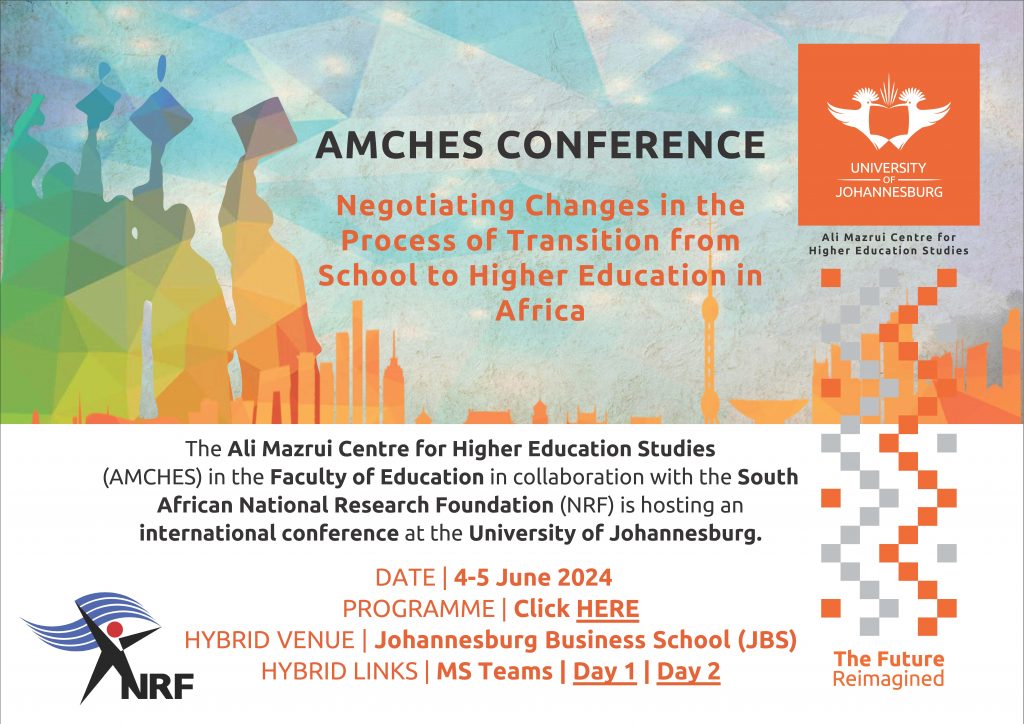News and Events
Home » Faculty of Education » Centres » Ali Mazrui Centre for Higher Education Studies (AMCHES) »AMCHES Celebrates the Promotion of Prof. Emnet Tadesse Woldegiorgis to Full Professor
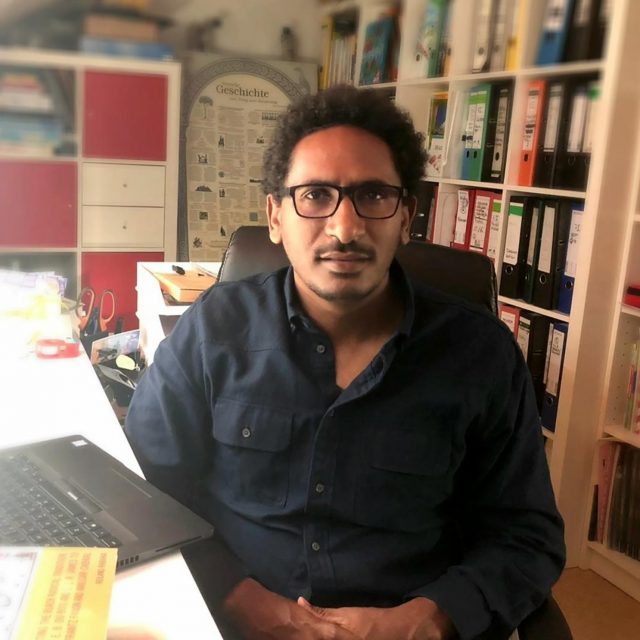 The Ali Mazrui Centre for Higher Education Studies (AMCHES) is proud to announce the promotion of Prof. Emnet Tadesse Woldegiorgis to the rank of Full Professor. This prestigious achievement reflects Prof. Emnet’s outstanding dedication, academic excellence, and influential leadership within both our institution and the wider academic community.
The Ali Mazrui Centre for Higher Education Studies (AMCHES) is proud to announce the promotion of Prof. Emnet Tadesse Woldegiorgis to the rank of Full Professor. This prestigious achievement reflects Prof. Emnet’s outstanding dedication, academic excellence, and influential leadership within both our institution and the wider academic community.
Prof. Emnet’s promotion is a significant milestone that highlights his sustained contributions to higher education research, student mentorship, and scholarly engagement. His work has not only elevated the profile of AMCHES but has also made a meaningful impact on the academic discourse in Africa and beyond.
We extend our heartfelt congratulations to Prof. Emnet on this well-deserved accomplishment. His leadership and scholarship will continue to inspire our community and shape future research initiatives. We look forward to his ongoing contributions to advancing our mission of fostering academic excellence and critical inquiry.
Please join us in celebrating this remarkable achievement and wishing Prof. Emnet continued success in his future endeavors.
Ali Mazrui Centre for Higher Education Studies (AMCHES)
The Centre welcomes:
- Dr Juliet Munyaradzi, Postdoctoral research fellow
- Dr Emmanuel Intsiful, Postdoctoral research fellow
- Dr Joseph Balogun, Postdoctoral research fellow
- Dr Baleni Sibanda, Postdoctoral research fellow
- Dr Olaide Agbaje, Postdoctoral research fellow
- Dr Simon Vurayai, Postdoctoral research fellow
- Dr Gloria Maina, Postdoctoral research fellow
Events
THEME | Negotiating Changes in the Process of Transition from School to Higher Education in Africa
DATE | 4-5 June 2024
VENUE | Johannesburg Business School (JBS)
PROGRAMME | Click here
INVITATION: PUBLIC LECTURE
The Centre for Education Rights and Transformation (CERT), NRF South Africa Chair in Community, Adult and Workers’ Education (CAWE), South African Research Chair in Teaching and Learning (SARChI: T&L) and the Ali Mazrui Centre for Higher Education Studies (AMCHES), University of Johannesburg invite you to a Public Lecture
Speaker: Dr J Naidoo (UNESCO) Date: 27 September 2023
Time: 14:00- 16:00 PM (SAST)
—
INVITATION: BOOK LAUNCH
The Ali Mazrui Centre for Higher Education Studies (AMCHES) invites you to the book launch
SADTU and the Struggle for Professional Unionism
Date: 28 August 2023
Time: 10:00 to 12:00 PM (SAST)
—
INVITATION: BOOK LAUNCH
The Ali Mazrui Centre for Higher Education Studies (AMCHES) invites you to the book launch
Title of the book: Higher Education in the Face of a Global Pandemic
Date: 30 May 2023
Time: 10:00 to 11:00 AM
—
INVITATION: BOOK LAUNCH
The Ali Mazrui Centre for Higher Education Studies (AMCHES) invites you to the book launch, ‘Knowledge Diplomacy in International Relations and Higher Education’
Date : Tuesday 14 February 2023
Time : 10:00 – 11:00 AM
Venue : Regeneration Conference Room, Madibeng
For more info Click Here.
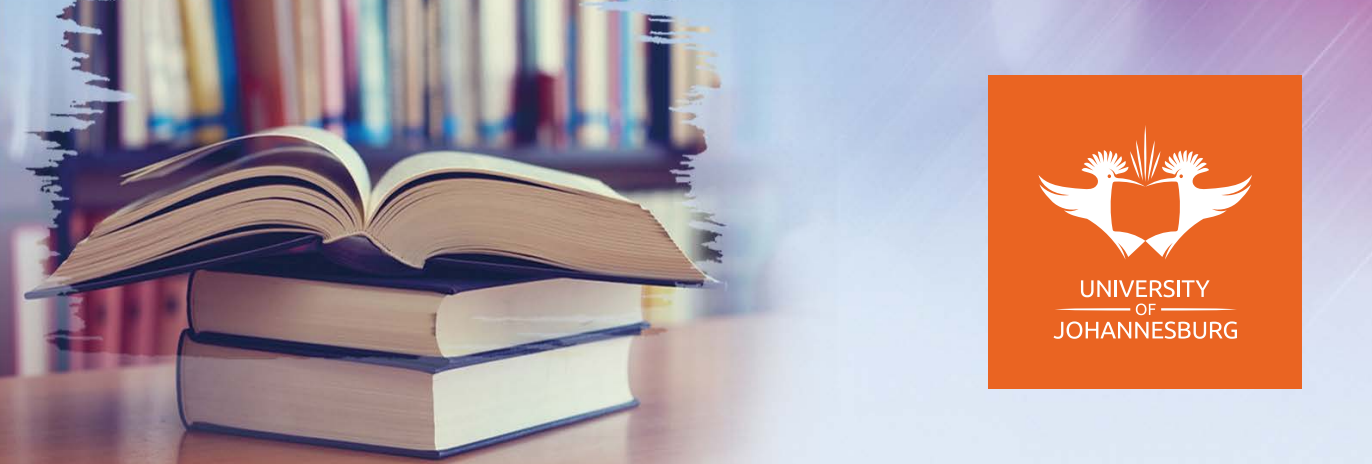
Archives
Distinguished Visiting Professor at AMCHES delivers keynote address
Distinguished Visiting Professor Jane Knight at the Ali Mazrui Centre for Higher Education Studies at the Faculty of Education, University of Johannesburg and Adjunct Professor of International, Comparative and Development Education at the Ontario Institute for Studies in Education, University of Toronto, delivered the keynote address at the 4th Annual Eric Molobi Memorial Lecture on 13 November 2019.
The title of her address was: “The Role of Higher Education in International Relations: Soft Power versus Knowledge Diplomacy”.
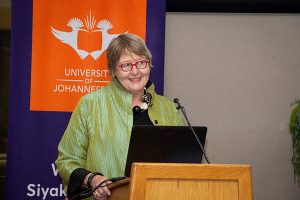
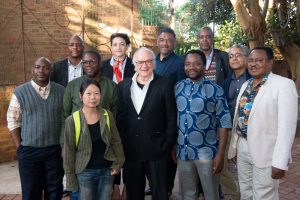
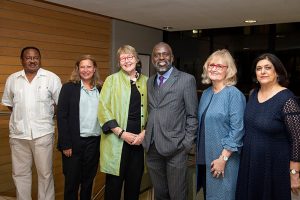
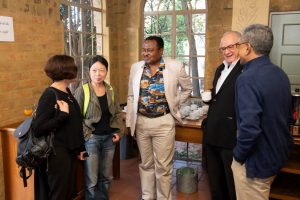
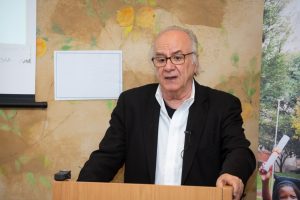
On 3 October 2019, the Centre co-hosted a public lecture by Prof Santos on the subject: Information, Understanding, Transformation: The challenges of the 4IR, at the Johannesburg Institute for Advanced Studies (JIAS). In his lecture, while acknowledging the opportunities of the Fourth Industrial Revolution, Santos warned against “technology take-over” in relation to intellectual endeavours and the risk of 4IR deepening existing inequalities in emerging economies. He also stressed that the rapid production of data and its use in shaping policy and public discourse had become big business, especially by policy think tanks and the likes of Cambridge Analytica. The lecture was followed by short responses from Profs Morgan Ndlovu, UNISA, Aslam Fataar, University of Stellenbosch, and Shireen Motala, University of Johannesburg.
Colloquium: Teaching and Learning in Context (RSA and France)
Colloquium on University Teaching and Learning in Context − 26 and 27 February 2018. The colloquium was jointly hosted by the Ali Mazrui Centre for Higher Education Studies and Le CNAM. Presenters for the colloquium were drawn from local and international universities, United States, France, United Kingdom, Switzerland.
The TLC papers were organised around the following subthemes:
- In-context pedagogy for university students
- Decolonisation of the curriculum
- Culturally responsive teaching and learning
- Emerging professionals, emerging scholars
- Learning opportunities and affordances
- Online and hybrid programs for diverse students: historically disadvantaged students, culturally diverse students, professionals/adult learners, etc.)
- Work-integrated Learning (WIL) and training
- Professional development for university lecturers
- Cross-border education and internationalisation
WCCES Executive Retreat
The World Council of Comparative Education Societies (WCCES) Symposium and the 5th Indian Ocean Comparative Education (IOCES) International Conference was preceded by an executive retreat, which saw the leadership of the Centre sharing a stage with the leadership of the co-hosting societies, the WCCES and the IOCES.
WCCES 1st Symposium
WCCES Symposium Comparative Education for Global Citizenship, Peace and Harmony through Ubuntu and 5th Indian Ocean Comparative Education (IOCES) International Conference Rethinking Epistemologies and Innovating Pedagogies to Foster Global Peace held on 21-22 June 2018.
The symposium objectives fell under the WCCES (Statute 2.1) broad goals:
- To advance education for international understanding in the interests of peace, intercultural cooperation, mutual respect among peoples and observance of human rights.
- To improve education systems so that the right of all to education may be more fully realised.
Presentations were done through concurrent sessions following guiding questions as noted below:
- What is the relationship between formal education and the sense of alienation/lack of inclusion?
- What is the relationship between the different levels of formal education achievement, including the highest degrees from reputable institutions of higher learning from across the globe and the prevailing societal problems?
The closing and lunch sessions included the following:
- Poem in honour of Mrs Winnie Madikizela Mandela by Prof Aïcha Maherzi, President MESCE (Translation in English read by Prof N’Dri T. Assié-Lumumba).
- Valediction address by Prof Ihron Rensburg, Chairperson, the South African National Commission for UNESCO and former Vice-Chancellor, University of Johannesburg: Conditionalities and Opportunities in Early Transition Societies: The Challenge for the Left.
Other conference and seminar presentations
Prof Michael Cross delivered a session on 28 June 2018 in response to an invitation by the Postgraduate School at the University of St Thomas in Mozambique at an event to mark the final session of their seminar series on Global Challenges for Higher Education in the South, which was attended by MED students.
Ndofirepi, A.P. (2018). Postcolonial African universities under siege: challenges and opportunities for decolonial epistemologies. National and International Conference on Education (NICE), Graceland Resort, Phuket, Thailand, 5-7 July 2018.
Neema-Abooki, P., Kisige, A. & Cross, M. (2018). Cross-border education and its influence on the quality of higher education. First Postdoctoral Conference of Southern Africa, Stellenbosch University, Cape Town, 3-5 October 2018.
Prof Assie-Lumumba N.T. Seminar and conference attendance and presentations among others: ‘The interface of education and gender equality and empowerment: Perspectives from the MDGs to the SDGs and Social Progress in Africa’ in the Fall 2018 Seminar series of the Institute of African Development on Sustainable Development Goals and the Challenges of Inclusion, Cornell University, Ithaca, New York, September 2018
‘Securing the position of African continent in the Fourth Industrial Revolution via interdisciplinary Research and Innovation in Universities’. This was the theme of the 2018 Postdoctoral Research Fellows’ Annual Forum, which took place at the University of Johannesburg’s Kerzner Building, School of Tourism and Hospitality on 20 November. While the Forum attracted Postdoctoral Research Fellows from various faculties and research centres from the entire university community, the Ali Mazrui Centre for Higher Education Studies was equally represented by four Postdoctoral Research Fellows (PDRFs) who included Dr Sibonokuhle Ndlovu, Prof Peter Neema-Abooki, Dr Dennis Zami Atibuni, and Dr Phefumula Nyoni. Dr Sibonokuhle Ndlovu presented on obstacles for students with disabilities within the context of South Africa’s higher education, while Prof Peter Neema-Abooki presented on financial sustainability within the context of revenue generation for public universities in Uganda.
The Ali Mazrui Centre for Higher Education Studies was launched at the University of Johannesburg on 3 August 2017 in the Council Chambers. Its mission is to contribute to enhancing the role of higher education towards social and economic development in Africa within the context of democratisation and social justice, and to be a Pan-African centre for scholarly research inquiry, training and professional development in higher education. This is being pursued through a range of activities that include higher education research; research training at PhD and master’s levels; professional development, particularly in the domain of executive leadership; and promotion of policy dialogue in higher education.
SEMINAR SERIES: LEADING UNDER CRISIS
Dr Glenda Kruss presented a seminar on 16 March 2017. The seminar was on ‘Higher education and innovation in informal settings: evidence from case studies in South Africa’. The paper aimed to identify conditions that facilitate and constrain innovation linkages between universities and actors in informal settings. It did so by reflecting on four in-depth case studies of networks between universities and marginalised communities, focused on innovation to support livelihoods in the South African context. The analysis highlighted how academics and universities, government agencies at various levels, community-based and co-operative actors, have been driven to interact with one another, to learn, innovate and develop new competences that promote the livelihoods of marginalised communities.
Prof Saleem Badat presented a seminar on 6 April 2017 on ‘Theorising and Researching University Student Politics in South Africa’. Prof Badat spoke on the history of theorising and research on university student politics in South Africa, and challenges of analysing and undertaking empirical research on student politics.
Dr Oliver Seale gave a talk entitled ‘Leading in Complexity: the case of deans’. The paper discussed the emergence of ‘executive deanship’ in South African higher education about a decade and a half ago, which was in keeping with international trends and local demands for efficiency and performativity. In this seminar, it was contended that the blanket introduction of executive deanship at universities in Gauteng appears not to have contributed to the envisaged operational efficiency and effectiveness as claimed.
Dr Jose Cossa presented a paper entitled ‘Addressing the Challenge of Coloniality in the Promises of Modernity and Cosmopolitanism to Higher Education: De-bordering, De-centering/Deperipherizing, and Decolonizing’. He argued that Western higher education was founded under classical modernist and classical cosmopolitan perceptions of how the world ought to be ordered (or Modernity) and how to nurture planetary conviviality (or Cosmopolitanism). This order and conviviality inform the way academic fields are shaped by their founding editors and scholars, who surround them, and continue to shape our engagement with one another as scholars who navigate the complexity of today’s world.
Mr Ahmed Essop, a research associate in the Centre, gave an interesting seminar presentation entitled ‘Rethinking Institutional Governance in Higher Education: The Role of Council’. He emphasised that governance, leadership and management challenges in public higher education institutions have been a perennial feature of the higher education system in the past decade or more and all the signs suggest that they will continue unless the underlying factors that give rise to these challenges are addressed.
Prof Jane Knight, a Distinguished Visiting Professor in the Centre, gave an inspiring seminar presentation entitled ‘The Changing Landscape of Internationalisation: New Developments and Unintended Consequences’. This presentation examined new developments and unintended consequences around the world that require new research, policy development and careful monitoring so that the benefits of internationalisation to individuals, institutions, nations and society outweigh the risks, both now and in the future.
SCHOLARSHIP OF TEACHING AND LEARNING (SOTL) IN THE SOUTH
Prof N’Dri Assie-Lumumba, a Distinguished Visiting Professor at the Ali Mazrui Centre, was a guest speaker at the SoTL in the South conference held at the University of Johannesburg on 24-27 July. The conference focused on the scholarship of teaching and learning in the global South and showcased exciting and innovative research methods, new findings and featured provocative debates. She spoke about ‘Critical Thinking in Contexts: Western Higher Education Legacies’ and ‘Dynamics of Teaching and Learning in the Global South’.
Prof Michael Cross and Mr David Matsepe (PhD student) presented a paper on ‘Re-thinking academic staff transformation: power, identity and transformation in South African universities’ at the Canada International Conference on Education (CICE-2017).
Prof Michael Cross, Felix Omal (PDRF) and two postgraduate students (David Matsepe and Loria Mokoena) presented papers at the Education Association of South Africa (EASA) 2017 Conference, hosted by the Faculty of Education Sciences, North West University, Potchefstroom.
Prof M Cross participated in a panel discussion at the launch of the Africa Special Interest Group (ASIG) – Africa SIG Bantaba during the 2017 CIES Conference in Atlanta. The word Bantaba originates from Gambia in West Africa and is a derivative of two words in the Mandinka language: ‘Bant’ (tree) and ‘Aba’ meeting place. Bantaba thus signifies a gathering of community members to discuss salient issues that affect the collective. Invited speakers included Hamidou Boukary, Consultant, Human Development Bond Consulting and formerly with the Association for the Development of Education in Africa (ADEA), and H.E. Oliver Wonekha, Ambassador of Uganda to the United States of America.
Dr Loise Jeannin (PDRF) was invited to participate in a research conference at the University of Caen, Normandie, France, in October 2017. The theme of the conference was ‘Challenges, debates, and perspectives: 50 years of educational sciences’. Dr Jeannin presented a paper on ‘Mobilité géographique, apprentissage, et positionnement pédagogique: La perception des enseignants chercheurs étrangers en Afrique du Sud’. Dr Loise Jeannin also participated in an international conference in Paris, France, on 4-7 July 2017, with the Education and Training Network. She presented a paper on ‘The adaptation process of international lecturers in South African universities: A case study’.
Knowledge & Change Seminar Series
The ongoing crisis in higher education requires a comprehensive review and reflection. The crisis has placed the challenge of leadership at the centre of academic debates. It is against this background that the Ali Mazrui Centre decided to dedicate the 2017 Seminar and Lecture Series to the theme ‘Leading under Crisis’.
Guest lectures
In March, Dr Glenda Kruss delivered a lecture on ‘Higher education and innovation in informal settings: Evidence from case studies in South Africa’.
In April, Dr Saleem Badat gave an inspiring presentation entitled ‘Theorising and Researching University Student Politics in South Africa’.
In May, Dr Oliver Seale, a Research Associate in the Centre, gave a talk entitled ‘Leading in Complexity: the case of deans’.
In July, Prof Ihron Rensburg gave an interesting talk on ‘Leadership Under Crisis: The Case of the University of Johannesburg’.
In August, Dr Jose Cossa, presented a paper entitled ‘Addressing the Challenge of Coloniality in the Promises of Modernity and Cosmopolitanism to Higher Education: De-bordering, De-centering/Deperipherizing, and Decolonizing’.
In August, Mr Ahmed Essop, a research associate in the centre, gave an interesting seminar presentation entitled ‘Rethinking Institutional Governance in Higher Education: The Role of Council’.
In November, Prof Jane Knight, a Distinguished Visiting Professor in the Centre, gave an inspiring seminar presentation entitled ‘The Changing Landscape of Internationalization: New Developments and Unintended Consequences’.
Launch of the Centre August 2017
The launch of the Ali Mazrui Centre for Higher Education Studies was held at the Council Chambers/Madibeng Lounge on 3 August 2017. Among other important messages, speakers highlighted the Centre’s mission to contribute to enhancing the role of higher education towards social and economic development in Africa within the context of democratisation and social justice.
Launch of Book Series
The launch of the Centre’s Book Series with Sense Publishers at the Council Chambers/Madibeng Lounge on 3 August 2017. The first three published volumes include M. Cross & A. Ndofirepi. (eds.). Knowledge and Change in African universities. Volume 1: Current Debates (Sense Publishers: 2017); M. Cross & A. Ndofirepi. (eds.). Knowledge and Change in African Universities. Volume 2: Re-imagining the Terrain (Sense Publishers: 2017); and Jane Knight and Emnet Woldegiorgis (eds.). Regionalization of African Higher Education: Progress and Prospects. (Sense Publishers: 2017). The book series is aimed at contemporary higher education issues.
Chris Brink Book Launch
JIAS, the Ali Mazrui Centre for Higher Education, and the Postgraduate School at UJ conducted a book launch in Gauteng titled, THE SOUL OF A UNIVERSITY Why excellence is not enough by Prof Chris Brink Emeritus Vice-Chancellor, Newcastle University, United Kingdom.
Tuesday Meetings
The broad aim of the Tuesday meetings is to afford the Centre’s PhD students and Postdoctoral Research Fellows (PDRFs), in particular, an opportunity to meet, discuss their research, and share challenges and strategies for increasing research output.
Objectives are to:
- Provide a platform to share knowledge, skills and experiences while also providing mentorship to PhD students.
- Provide opportunities to discuss individual research initiatives and reflect on progress among PDRFs and PhDs.
- Identify challenges and explore areas that need support and to share intervention strategies.
- Draw from the diverse areas of expertise and to complement one another’s strength.
For more details on our next Tuesday meetings, email Loria on: loriam@uj.ac.za

